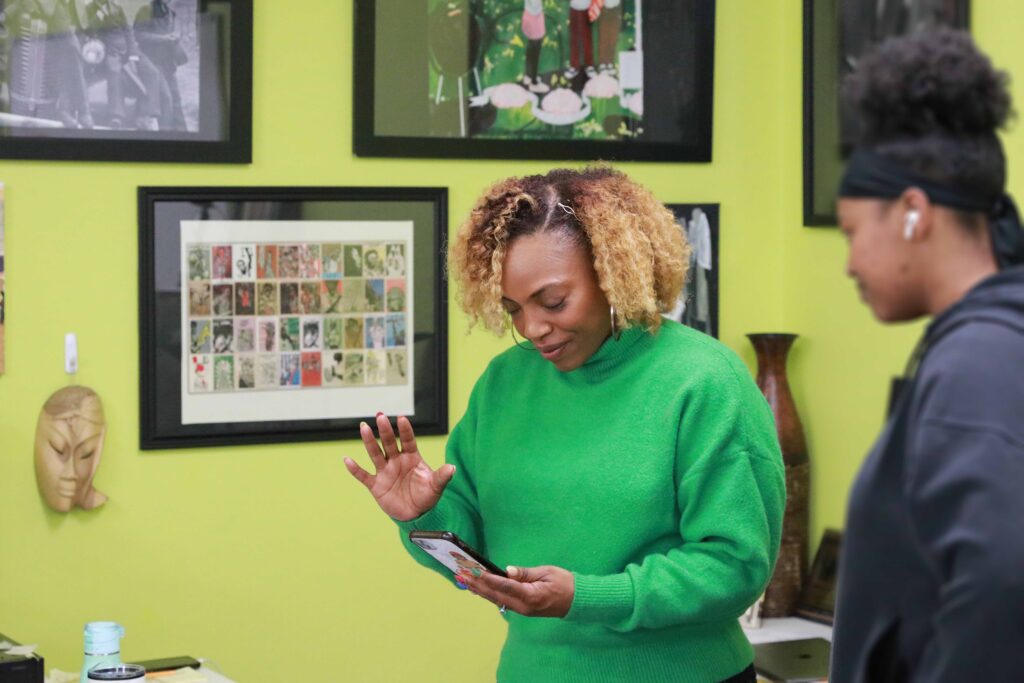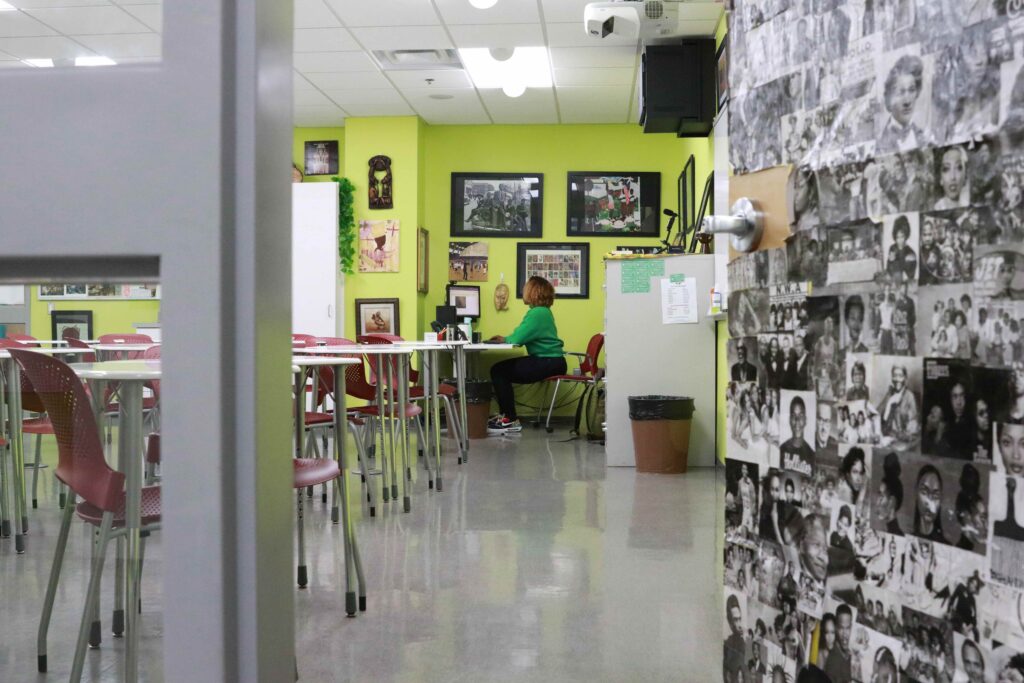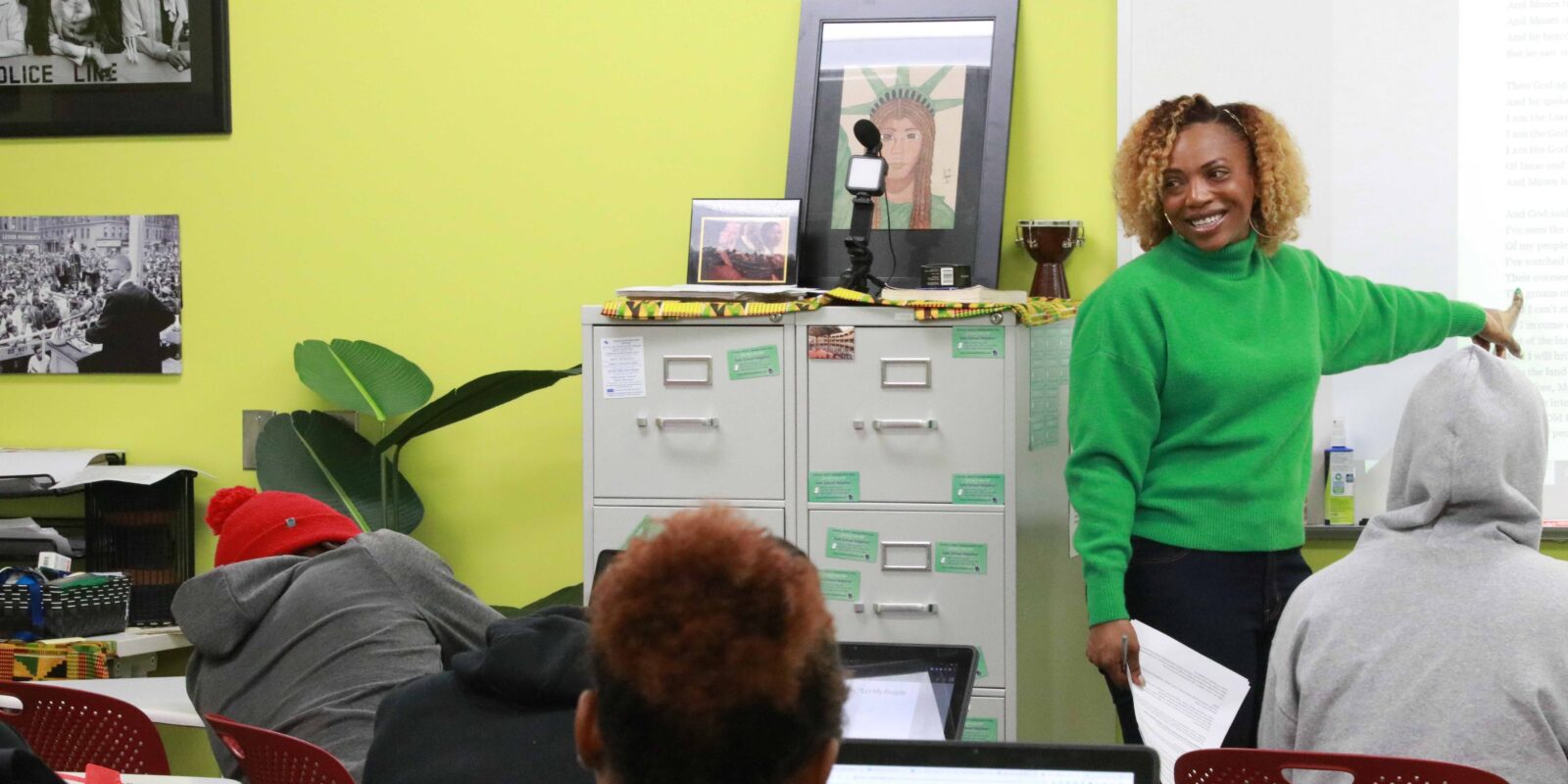The bookshelf in the back of Donja Thomas’ classroom is brimming with wide-ranging titles: Brown Girl Dreaming, by Jacqueline Woodson; Gallant, by V.E. Schwab; Homegoing, by Yaa Gyasi; Cloud Cuckoo Land, by Anthony Doerr. The collection is every bookworm’s dream, and an extension of the titles Thomas grew up reading.
“As a child, I grew up reading books by authors like Walter Dean Myers and Virginia Hamilton,” Thomas said in a 2019 TED Talk. “Because of them, I believed that if my people could fly, I probably could too.”
A three-time alum, Thomas, ’03 BA, ’07 MS, ’16 PhD, is an English teacher — the first Black educator in the school’s English department —and the Black Studies curriculum developer at Gahanna Lincoln High School in Ohio. For Thomas, truth lies in literature and history — an idea she and her students regularly explore.
“That is important,” Thomas said. “To understand how and why we’re here, how we can learn from those that have come before us, to teach us who we are, to give us direction and allow us to continue to establish certain, I would say, truths that liberate all of us.”
In Thomas’ African American Voice class, students delve into literature — from books and poems to songs — to discover and reclaim those truths.
Art as truth
Thomas’ class begins bright and early each week at 7:35 a.m. on Monday. Students are greeted by upbeat hip-hop music as they trickle into the classroom. One student pulls out the assigned reading, Kindred by Octavia Butler, and settles in with a Ziploc bag of oatmeal bites. Another asks Thomas’ advice on her senior photos.
“I love that one,” Thomas says, pointing at her student’s phone with her painted nails, a different color on each finger.

The clock strikes 7:45 a.m., and it’s time for announcements. Tomorrow, the class will take a field trip to the King Arts Complex and meet April Sunami, a local mixed-media artist. The bus leaves promptly at 9:15 a.m.
“What happens if you miss the bus?” a student jokes.
“You won’t be coming,” Thomas tells him. The class laughs.
Thomas is a self-proclaimed “fluid” educator — teaching a modified curriculum each year based on what’s relevant to students in the moment. Today’s lesson was developed over the weekend, pointing to the upcoming field trip and the book, Kindred. The story features a 20th-century Black woman who is dragged back in time to 19th-century Maryland, where her ancestor is enslaved.
“It’s very symbolic of the fact that, literally, the past is a part of us, whether we recognize it or not,” Thomas says.
This theme is integral to the class. Thomas’ course — which she created herself, from scratch — focuses on how Black contributions shaped American history and culture. The class is the subject of her dissertation, which emphasizes the importance of Black Studies in developing cultural consciousness.
“How can one study history, science, race, class, language, and economics in American classrooms without including an intentional focus on one of the foundational communities—Black people across the African Diaspora— that formed this country?” Thomas writes in the introduction.
African American Voice shines a spotlight on Black authors, songwriters, artists and thinkers — a community that is infrequently represented in education.
“When I came in, there was hardly any Black representation in the literature that was being shared and studied in the classroom,” Thomas said in an interview for the college’s Inspire podcast. “I just felt that it was important for me to push against that and to create the space for students to be able to learn the things that I wish I was able to learn in the class when I was in grade school.”
Together, Thomas and her students explore “Blackness” in multiple disciplines. The upcoming King Arts Complex visit will examine the connections between Black art and history. Looking around Thomas’ classroom, this is a subject she is intimately familiar with. The colorful walls are plastered with paintings, pictures, masks and patterned cloth.

“We’re exposed to so many things that can give us insight into our roots — into who we are and our purpose — all the time,” Thomas said. “And art is a great vessel for that.”
To demonstrate this, Thomas pulls up Aaron Douglas’ painting, “Let My People Go.” The students discuss their first impressions.
“I see a horse and a spear,” one says.
“War,” another contributes.
Together, the class breaks down the painting, an interpretation of the biblical story of Moses leading the enslaved people of Israel out of Egypt. Douglas purposefully connected American civil rights and the Israelites’ liberation struggle, Thomas says.
“It’s using biblical history but tying it to experience that Black people were not only experiencing then — I think it still has relevance,” Thomas says.
Poems as truth
Douglas’ painting accompanies a poem of the same name in God’s Trombones, a book of poems and sermons by writer and civil rights activist James Weldon Johnson. The poem recounts the Old Testament story of Moses bringing plagues against Egypt’s Pharaoh and parting the Red Sea. The class reads the poem, popcorn style, taking turns reciting the lines:
And God said to Moses:
I’ve seen the awful suffering
Of my people down in Egypt.
I’ve watched their hard oppressors,
Their overseers and drivers;
The groans of my people have filled my ears
And I can’t stand it no longer
Thomas wraps up the recitation:
Listen! — Listen!
All you sons of Pharaoh.
Who do you think can hold God’s people
When the Lord God himself has said,
Let my people go?
The students note the difference between power and authority.
“Remind yourself of the power that you have within you,” Thomas says. “Even when things get rough or you feel like everything is coming against you, you have the power.”
Songs as truth
The class turns to a different form of literature: songs.
They search for messages in Black spirituals: “Wade in the Water” directs runaways to walk through rivers, erasing their scents. “Swing Low, Sweet Chariot” references the Ohio River — the boundary between the South and freedom in the North. “Go Down, Moses,” similar to Johnson and Douglas’ “Let My People Go,” references the Israelites’ story, empowering slaves to free themselves.
The class listens to a performance of “Go Down, Moses” by Steven Kirby and takes a short break. When they return, it is time to explore a different kind of music. On the SMART Board, Thomas plays a video of hip-hop group De La Soul performing “Stakes is High” on The Tonight Show Starring Jimmy Fallon. The lights are out, and vibes and vibrations reverberate through the room.
Neighborhoods are now hoods ’cause nobody’s neighbors
Just animals survivin’ with that animal behavior
Under I, who be rhymin’ from dark to light sky
Experiments when needles and skin connect
No wonder where we live is called the projects
When the song — which comments on 21st-century social issues — ends, students discuss their favorite lyrics. One pulls up the group on the app Spotify.
The class’ selected lyrics include, “People try to snatch the credit, but can’t claim the card,” and “No wonder where we live is called the projects” — a reference to urban tenements. Like Douglas’ and Johnson’s works, the song examines historical truth from a new perspective, Thomas says.
The class ends. A student calls Thomas over to point out more lyrics. They chat for a minute, then exchange a quick hug.
“I love working with them,” Thomas says, smiling.
After 15 years of teaching African American Voice, students still inspire Thomas to keep pushing forward.
“I feel like I have the best job ever, simply because I’m able to be around these young people and see who they truly are, and understand their perceptions, understand that they really are here, I think, to create a new way of thinking,” Thomas said.

